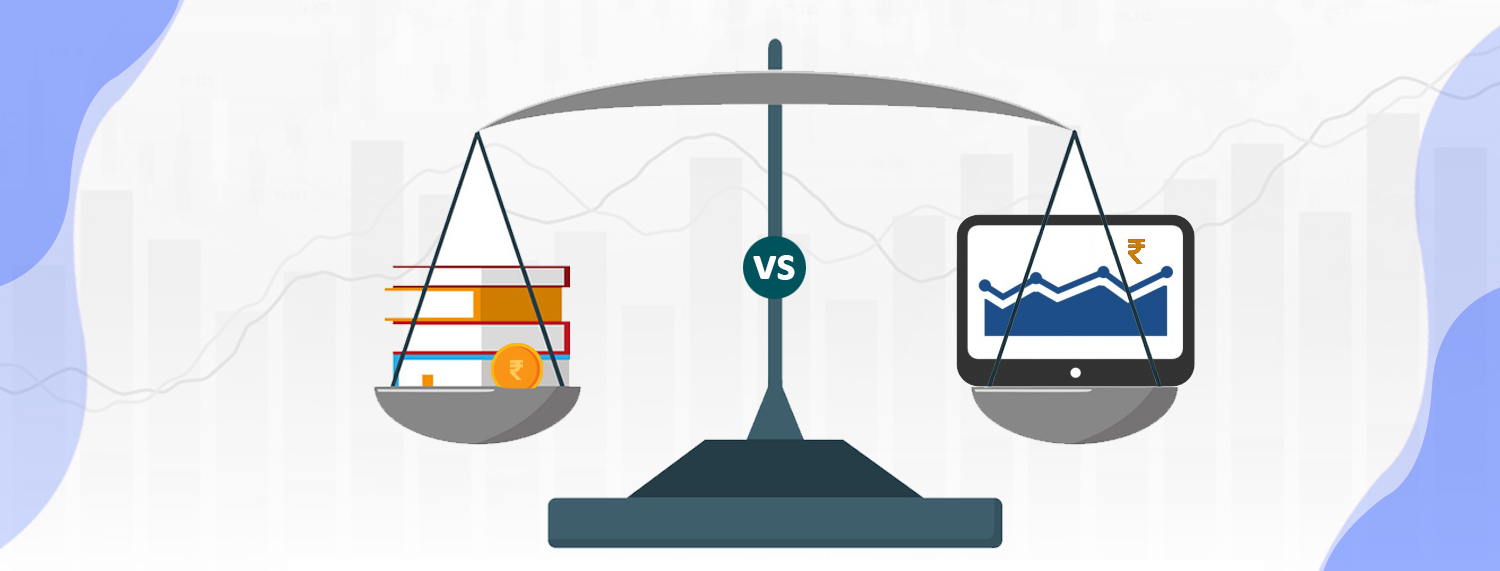Book value vs market value: their differences

Before making an investment decision, an investor may evaluate a company's prospects in various ways. Calculating the asset class's book value and stock value are two other approaches.
Before making an investment decision, an investor may evaluate a company's prospects in various ways. Calculating the asset class's book value and stock value are two other approaches.

Open a Demat Account
What is the Book Value?
Its balance sheet determines the book value of a firm. The name comes from the fact that it is focusing on the company's accounting "files." The book value is proportional to the disparity between the asset and liability values.
What is the concept of market value?
Its price determines the market value of an asset on the stock market at a certain point in time. The market value is calculating by multiplying its current market price by the total number of shares outstanding.
Comparing book value and market value:
When comparing the book value and market value of a stock, an investor can encounter one of three scenarios.
In scenario 1, The book value is greater than the stock value in scenario 1. When this occurs, it usually indicates that the public is losing faith in its potential success. It may be due to an unfavorable economy, organizational issues with the firm, or lapse of judgment on the part of the investor. Profit buyers tend to invest in those securities because they expect the business can do well in the future, increasing the stock's market value.
The stock valuation exceeds the book value In scenario 2. The market thinks the firm has the potential to expand and improve its book value. The number of companies at the top of the Index, such as the Sensex or the S&P 500, has a higher stock price than their book value. Development investors are interested in this case. However, it's a good idea to keep in mind that the stock may be overvaluing.
The book and retail values are the same in the third and final case. In this case, analysts conclude that the company's reported assets are more or less the same as those disclosed on the balance sheet.
Book Value vs. Market Value:
To determine which value to weigh when investing in a given stock, an investor must first understand where the gaps between book and market value exist. Let's look at the difference between the book and market valuation.
1. Book value depicts the actual value of the company's properties, while stock value reminds the customer of its or its assets' expected value.
2. The book value represents the value of the company's shares, while the market value represents the highest price at which the company's stock will exchange on the stock exchange.
3. The level of fluctuation between the book value and the market value of the properties is also different. When we compare book value to market value, we can see that the book value is more stable. It is updated regularly, generally as the organization announces its earnings. On the other hand, the stock valuation fluctuates a lot during the trading day as the securities are sold.
4. The book valuation represents the actual cost of acquiring an item, while the market value reflects current market conditions.
5. Whether the corporation intends to sell an item, the book valuation and market value vary greatly. The book valuation merely represents the asset's accounting value, while the stock value precisely reflects the asset's actual market appeal.
When making an investment decision, keep the role of book value and market value in mind. It can assist you in determining if the commodity is undervalued, overvalued, or reasonably priced.
Make contact with your broker to make the investment of your choosing and strengthen your financial position.
Recent Posts
Download The Dealmoney App Now
Latest Top 10 Performing Funds
| Scheme Name | NAV on | Holdings | Returns (%) | Fund Manager | Rating | |
|---|---|---|---|---|---|---|
| Tata Nifty Pvt Bank ETF | 112.1161 | ₹ 953.7591472 Cr | 24.1384707538614% | Sailesh Jain | 1 | |
| ICICI Pru Technology Fund(G) | 53.41 | ₹ 35414.76052571 Cr | 23.1765904789635% | Sankaran Naren , Vaibhav Dusad , Priyanka Khandelwal | 2 | |
| Edelweiss ETF - Nifty Bank | 2047.9931 | ₹ 72.31 Cr | 22.3638817077987% | Bhavesh Jain , Hardik Verma | 3 | |
| SBI-ETF Nifty Bank | 202.4212 | ₹ 242503.74 Cr | 22.2708812094408% | Raviprakash Sharma | 3 | |
| Kotak Banking ETF | 205.2306 | ₹ 379580.55 Cr | 22.2131952311096% | Devender Singhal , Satish Dondapati | 3 | |
| Motilal Oswal Nifty Bank Index Fund-Reg(G) | 7.3638 | ₹ 4036.5684866 Cr | 22.0669674905138% | Swapnil P Mayekar | 2 | |
| Tata Digital India Fund-Reg(G) | 13.9041 | ₹ 34333.78900578 Cr | 19.4938524951637% | Meeta Shetty , Rahul Singh | 2 | |
| Aditya Birla SL Digital India Fund(G) | 51.49 | ₹ 38115.86 Cr | 19.046875% | Kunal Sangoi | 5 | |
| Kotak Small Cap Fund(G) | 61.52 | ₹ 124241.39 Cr | 18.6944214108026% | Pankaj Tibrewal | 2 | |
| Quant Small Cap Fund(G) | 38.9382 | ₹ 176.1202212 Cr | 17.7394878340161% | Ankit Pande , Vasav Sahgal , Sanjeev Sharma | 1 |
| Scheme Name | NAV on | Holdings | Returns (%) | Fund Manager | Rating |
|---|
